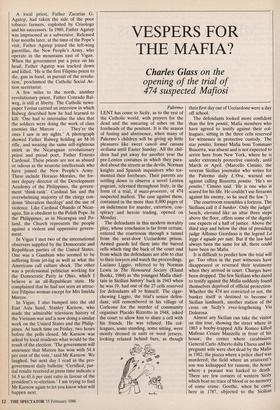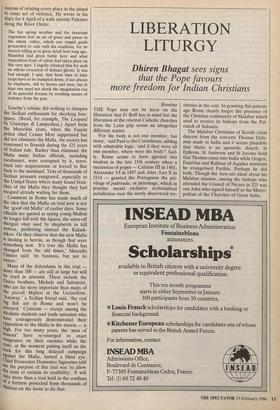VESPERS FOR THE MAFIA?
Charles Glass on the
opening of the trial of 474 suspected Mafiosi
Palermo LENT has come to Sicily, as to the rest of the Catholic world, with prayers for the dead and the smearing of ashes on the foreheads of the penitent. It is the season of fasting and abstinence, when many of Palermo's children will be giving up little pleasures like sweet canoli and cassata siciliana until Easter Sunday. All the chil- dren had put away for another year the pre-Lenten costumes in which they para- ded about the streets as the devils, Norman knights and Spanish inquisitors who tor- mented their forebears. Their parents are settling down to observe a novel Lenten pageant, televised throughout Italy, in the form of a trial, il maxi-processo, of 474 suspected mafiosi. The case against them, contained in the more than 8,000 pages of an indictment for murder, extortion, con- spiracy and heroin trading, opened on Monday.
The defendants in this modern morality play, whose conclusion is far from certain, entered the courtroom through a tunnel from the next-door Ucciardone prison. Armed guards led them into the barred cells which ring the back of the court and from which the defendants are able to chat to their lawyers and watch the proceedings. Luciano Liggio, referred to by Norman Lewis in The Honoured Society (Eland Books, 1984) as 'the youngest Mafia chief- tain in Sicilian history' back in 1943 when he was 19, had one of the 27 cells reserved for defendants all to himself. The cigar- chewing Liggio, the trial's senior defen- dant, still remembered in his village of Corleone for the murder of community organiser Placido Rizzotto in 1948, asked the court to allow him to share a cell with his friends. He was refused. His col- leagues, some standing, some sitting, were mostly dressed in suits or wool jerseys, looking relaxed behind bars, as though their first day out of Ucciardone were a day off school.
The defendants looked more confident than the few pentiti, Mafia members who have agreed to testify against their col- leagues, sitting in the three cells reserved for witnesses in protective custody. The star pentito, former Mafia boss Tommaso Buscetta, was absent and is not expected to arrive here from New York, where he is under extremely protective custody, until March or April. (Marcello Cimino, the veteran Sicilian journalist who writes for the Palermo daily L'Ora, warned me against calling Buscetta pentito. 'He's no pentito,' Cimino said. 'He is one who is scared for his life. He couldn't use firearms against his enemy, so he used the law.') The courtroom resembles a fortress. The Sicilians call it il bunker. Only the judges' bench, elevated like an altar three steps above the floor, offers some of the dignity one expects of a hall of justice. Above the third step and below the chin of presiding judge Alfonso Giordano is the legend La legge é uguale per tutu. But if the law had always been the same for all, there could have been no Mafia.
It is difficult to predict how the trial will go. Too often in the past witnesses have disappeared or reversed their testimony when they arrived in court. Charges have been dropped. The few Sicilians who dared to testify against the Mafia suddenly found themselves deprived of official protection. Whether the 474 are convicted or not, the bunker itself is destined to become a Sicilian landmark, another station of the cross on Sicily's ever-lengthening Via Dolorosa.
Almost any Sicilian can take the visitor on this tour, showing the street where in 1963 a booby-trapped Alfa Romeo killed Mafioso Cesare Manzella in front of his house; the corner where carabiniere General Carlo Alberto dalla Chiesa and his pregnant wife were shot dead by the Mafia in 1982; the piazza where a police chief was murdered; the field where an aristocrat's son was kidnapped for ransom; the house where a peasant was hacked to death. There are few corners of western Sicily which bear no trace of blood or no memory of some crime. Goethe, when he came here in 1787, objected to the Sicilian custom of relating every place in the island to some act of violence. He wrote in his diary for 4 April of a walk outside Palermo along the River Oreto: The fair spring weather and the luxuriant vegetation lent an air of grace and peace to the whole valley, which our stupid guide proceeded to ruin with his erudition, for he started telling us in great detail how long ago, Hannibal had given battle here and what stupendous feats of valour had taken place on this very spot. I angrily rebuked him for such an odious evocation of defunct ghosts. It was bad enough, I said, that from time to time crops have to be trampled down, if not always by elephants, still by horses and men, but at least one need not shock the imagination out of its peaceful dreams by recalling scenes of violence from the past.
Goethe's rebuke did nothing to dampen the Sicilian enthusiasm for shocking fore-
igners. (Read, for example, The Leopard by Giuseppe di Lampedusa.) Apart from the Mussolini years, when the Fascist police chief Cesare Mori suppressed but did not eliminate the Mafia, the society has continued to flourish during the 125 years of Italian rule. Rather than eliminate the Mafia many Italian officials, including carabinieri, were corrupted by it, terro- rised into acquiescence or forced to flee back to the mainland. Tens of thousands of Sicilian peasants emigrated, especially to the Unitcd States where many found bran- ches of the Mafia they thought they had escaped already waiting for them.
Comment in Rome has made much of the idea that the Mafia on trial now is not the 'good old Mafia' of earlier days. Some Officials are quoted as saying young Mafiosi no longer kill with the lupara, the sawn-off Shotgun once used by shepherds to kill Wolves, preferring instead the Kalash- nikov. Or they observe that the new Mafia Is dealing in heroin, as though that were something new. 'It's true the Mafia has Changed from the old times,' Marcello Cimino said: 'its business, but not its nature.'
Many of the defendants in this trial — more than 100 — are still at large but will be tried in absentia. These include the Greco brothers, Michele and Salvatore, Who are far more important than many of the piccoli Mafiosi in the Ucciardone. Anyway,' a Sicilian friend said, 'the real big fish are in Rome and won't be arrested.' Cynicism — except among the Idealistic students and trade unionists who have courageously demonstrated their °Pposition to the Mafia in the streets — is high. For too many years, the 'men of honour' have re-emerged to exact vengeance on their enemies while the state, at the moment patting itself on the hack for this long delayed campaign against the Mafia, turned a blind eye. Chief Prosecutor Domenico Signorino told tne the purpose of this trial was `to allow the state to reclaim its credibility'. It will take more than a trial held in the confines of a fortress protected from thousands of Mafiosi on the loose to do that.






































 Previous page
Previous page